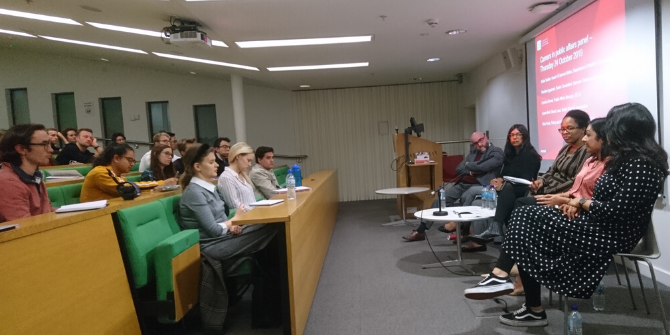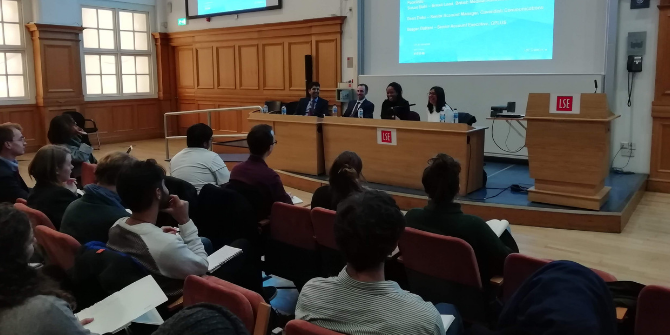Power dynamics isn’t something that often comes up when volunteering is discussed but understanding your role as a volunteer in the relationship with the beneficiary can determine the success of a programme. In this piece David Coles, LSE Volunteer Centre Manager, shares some of his failings, what he learnt and some tips to ensure that you volunteer in a positive manner.
I first volunteered in Ghana just over ten years ago and the concept of power dynamics and how to volunteer sensitively didn’t even enter my mind. I was there to help, what else did I need to consider? It started to dawn on me that I might not actually be that useful when I came in to land in Accra and I looked out the window to see street lights. I didn’t even know if Ghana had electricity and here I was ready to solve all of their ills through football coaching. Something wasn’t adding up here. Was it my fault for not having done my research? Of course. Was it the responsibility of the organisation I was volunteering with to educate and train me on what I’d be doing? Absolutely.
After a great welcome, and a couple of weeks of football coaching, the team I was working with had a tournament. One of the players that I had been coaching had been attending training every day and I, and another international volunteer, had taken a liking to him. However, the head coach, who have founded the club and worked with these players for a long time, said he wasn’t ready to play in the match. We argued back and forth and in the end my force of will won the debate. He played. And he was rubbish, conceding the team three goals in the first twenty minutes and ended up being subbed, probably feeling quite humiliated.
Reading the above you might think this was just a football match, but it was so much more than that. This was about the power dynamics between me, the volunteer, and the beneficiary, the head coach and players. I thought I knew what was best and, dammit, I was there to help. Everybody should get out of the way and allow me to do that. I was imposing my world view on the situation and not listening to the people I was working with and for. The words ‘arrogance’ and ‘white saviour’ probably come to mind, perhaps with a few others. You’d be right. I had abused my position to force my opinion on to a situation. It didn’t matter if I was right or wrong; it wasn’t my call. I wish I’d taken the Sidekick Pledge back then. Luckily for me the head coach accepted that apology I offered the next day and he’s a particularly good friend of mine now. He’s taught me a lot about coaching and many other life skills in the subsequent years.
The above is a very clear cut example of power dynamics between a volunteer and a beneficiary but it can happen in any such relationship. Volunteering can often embed these dynamics when we should be aiming to move away from this position. The paradox that appears when volunteering with refugees in the UK, as opposed to volunteering overseas, is that they are the ones coming to a new country but the power still resides with the person from the the global north.
So what steps can you take to help ensure that when volunteering the beneficiaries are seen equals?
- Moving from sympathy to empathy to compassion
It isn’t hard to feel sympathy for others. Turning on the news, listening to a Band Aid single or seeing a charity fundraising appeal automatically makes us feel bad for those that are suffering. Feeling sympathetic for someone else isn’t a bad thing in itself, but it can lead to pity and therefore not relating to the images that you’re seeing. “That would never happen to me or my family” or “that’s sad but the answer looks obvious” are common thoughts. When we do this we continue to see those people as ‘the other’. There is an emotional distance despite how close you might physically be to that person.
Being empathetic is an important step, it moves us to think and feel about what it would be like if I was walking in those people’s shoes. It starts to become a shared human experience rather than an ‘us and them’ one. Unlike sympathy this isn’t automatic and takes work and practice.
Compassion is turning your empathy in to action. This is when you truly understand your role in the issue and what you can do to help. This is when you’re ready to volunteer for the cause.
- Learn before we serve
When you’re enthusiastic to help it’s tempting to want to jump straight in and that’s completely understandable. But before we can help others we need to understand the situation, the context, the politics/Politics associated with it. A responsible charity that you’re looking to volunteer with should provide a lot of this information at relevant training but keep an eye out for blogs, articles, meet-ups and any other way to learn about the cause that you’re passionate about. When you do start volunteering you’ll be in a much better position to make an impact.
- Get to know the individuals behind the stereotypes
Relating to my story at the top, this is what I should have done. I fell into a common trap which is to believe the stereotype that West Africans need help from the global north and aren’t agents of change themselves. This is a falsehood but many from the ‘Band Aid generation’ believe. Stereotypes do huge damage to all involved.
Going beyond the stereotype doesn’t mean to stop reading mainstream media or putting down a research paper on an issue but taking in to account that these resources sometimes don’t provide all the answers. Try to read, or listen, to first hand accounts from the beneficiaries that you’re working with and appreciate that they are individuals in the problems that they’re facing. The issue you’re passionate about shouldn’t define who they are as a person.
- Understand your privilege
If you know me (white, heterosexual and male) you’ll think that I have a lot of privilege to understand and check. And you’d be right. Firstly, what is privilege? One definition, but not the only one, is, “Privilege exists when one group has something of value that is denied to others simply because of the groups they belong to, rather than because of anything they’ve done or failed to do. Access to privilege doesn’t determine one’s outcomes, but it is definitely an asset that makes it more likely that whatever talent, ability, and aspirations a person with privilege has will result in something positive for them” (Peggy McIntosh). Check out this excellent video made by LSE students about the subject.
Many of us have some form of privilege in one way or another and nobody is asking you to apologise for it. Fairly obviously you can’t change who you are. But don’t disregard it. You should try and be aware of what it brings to situations and how society might treat you differently depending upon it. Understanding such issues when volunteering will help us all move away from detrimental power dynamics. It will help you be an ally.
- Be humble
All of the above points and the experience I describe at the top lead us to this. Be humble in what you do. This doesn’t mean be passive but understand that you won’t have all of the answers all of the time, it’s not always your place to help and you might have to have your beliefs challenged on certain occasions. This is a good thing. It’s how we learn and improve on what we’re doing and you should continuously be looking to do this. Nobody has all the answers to the questions we’re trying to deal with, if they did then the problems wouldn’t exist. Create space to learn from other volunteers and if possible the beneficiaries you’re working with.
Be aware of the above points but don’t let them put you off. Volunteering is one of the most powerful ways of making change in society, bringing people together and increasing understanding about about other people.
So there are some points about how we can volunteer sensitively and be aware of power dynamics in volunteer/beneficiary relationships. Please feel free to feedback with further examples of good practice or challenge my thoughts.
If this has inspired you to volunteer, check out one of our other 200+ ongoing opportunities or book a one-to-one with David Coles, the Volunteer Centre Manager if you have more questions. If you are short on time, then take a look at the one-off opportunities taking place in Lent Term organised by the LSE Volunteer Centre. And why not follow us on Facebook, Twitter, and Instagram to stay up-to-date with our events and opportunities and read our blog for more volunteering tips and stories.






3 Comments